Ukraine’s energy system hit again as temperatures fallpublished at 17:15 Greenwich Mean Time
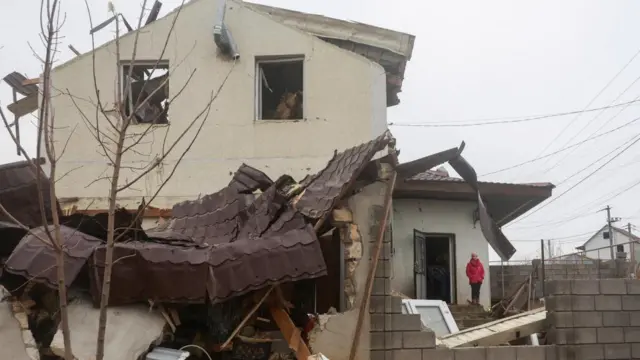 Image source, Reuters
Image source, Reuters
We’re wrapping up our live coverage on the aftermath of Russia’s overnight attack on Ukraine’s power grid. Here’s a quick recap of today’s key developments:
- Russia’s leader, Vladimir Putin, has threatened to target Kyiv’s “decision-making centres” with its new ballistic missile, Oreshnik
- Putin said the attack is a response to Ukraine’s use of long-range US and UK weapons inside Russia
- A Ukrainian MP told the BBC that Putin’s claim was “ridiculous”, as Ukraine has been under attack since 24 February 2022
- No fatalities were reported after the overnight attack, but it left more than one million people without power
- Ukraine’s President Volodymyr Zelensky called the attack a “vile escalation”, adding that cluster munitions were used “specifically against civilian infrastructure”
- He also discussed the attack with UK Prime Minister Keir Starmer, who described targeting the energy sector as “depraved”
Thanks for joining us today. This page was edited by Tinshui Yeung and Nathan Williams, and written by Lana Lam, Asya Robins, Ian Aikman, and Seher Asaf.
Hot food in the cold winterpublished at 16:57 Greenwich Mean Time
Kharkiv, Ukraine’s second-largest city, has been targeted in Russia’s overnight attack.
Despite this, residents close to the frontline will receive Thanksgiving turkey.
These turkeys are part of Ukrainian Railway’s “Food Train” project, which prepares and delivers hot meals to those in need across Ukraine.
In these pictures, staff members of the project are preparing turkey dishes for those living near the frontline in Kharkiv.
 Image source, EPA-EFE/REX/Shutterstock
Image source, EPA-EFE/REX/Shutterstock
 Image source, EPA-EFE/REX/Shutterstock
Image source, EPA-EFE/REX/Shutterstock
 Image source, EPA-EFE/REX/Shutterstock
Image source, EPA-EFE/REX/Shutterstock
Putin’s claim of responding to strikes in Russia is ‘ridiculous’, says Ukrainian MPpublished at 16:20 Greenwich Mean Time
We’ve just heard from Oleksiy Goncharenko, MP for the city of Odesa, who says Russian President Vladimir Putin’s claim that last night’s attacks were in response to Ukraine using UK and US missiles is “ridiculous”.
“What was 24 February 2022 in response to?” asks Goncharenko, speaking on the BBC’s World at One programme.
As a reminder, 24 February 2022 was the day Russia’s invasion of Ukraine began.
Odesa was one of the cities targeted in Russia’s overnight strikes, with one person reported injured.
Goncharenko says energy has been partially restored to parts of the city following outages earlier in the day.
- Find out more about why Putin’s claim of responding to strikes in Russia is deliberately misleading
Street power: Portable generators bring Lviv residents back onlinepublished at 15:49 Greenwich Mean Time
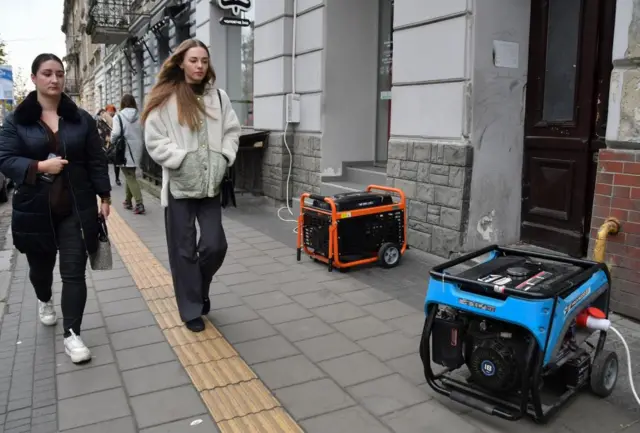 Image source, EPA
Image source, EPA
As we reported earlier, Ukrainians have to rely on generators when the main power supply is cut.
In these pictures, you can see portable power stations scattered along the streets in the western Ukrainian city of Lviv. These petrol-powered generators are keeping businesses, homes, and critical infrastructure running.
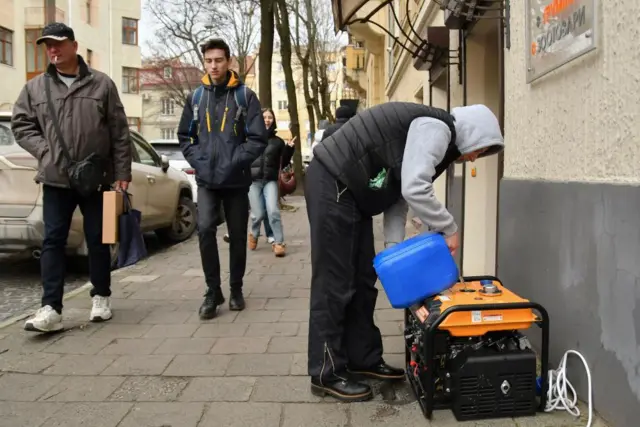 Image source, EPA
Image source, EPA
Kherson could be left without power for dayspublished at 15:23 Greenwich Mean Time
Vitaliy Shevchenko
BBC Monitoring’s Russia editor
Kherson, a major regional centre in southern Ukraine, could be left without electricity for days after the Russian attack this morning, local authorities say.
“In the worst-case scenario, Kherson could be left without electricity for several days. We’re doing all we can to restore supplies earlier,” local administration head Roman Mrochko said on social media. He added that other vital supplies were also affected.
“We hope to be able to supply electricity to critical infrastructure facilities in the morning and ensure stable water, gas and heating supplies for the public,” he said.
“We’re organising drinking water supplies to parts of the city. We’ll deliver hot food to residents of buildings with electrical stoves.”
Kherson was home to more than 270,000 residents before the full-scale Russian invasion, but many have since left because of the war.
Russia ‘will not allow’ Ukraine to get nuclear weaponspublished at 14:56 Greenwich Mean Time
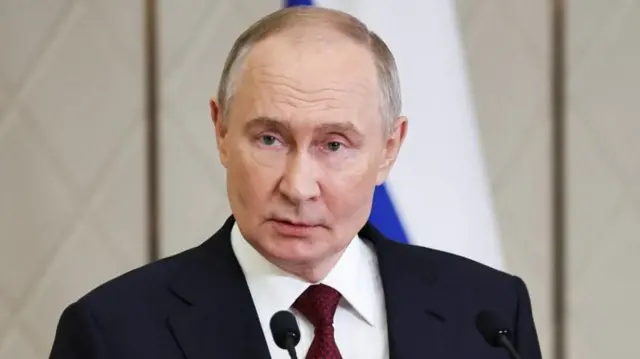 Image source, Reuters
Image source, Reuters
The Russian president holds a news conference at a summit in Astana, Kazakhstan
More from Russia’s President Vladimir Putin now, as he holds a news conference in Kazakhstan.
Russia’s President Vladimir Putin has made more comments about Ukraine at his news conference in Kazakhstan.
He says Moscow will use “all means of destruction at Russia’s disposal” were Ukraine to ever get hold of nuclear weapons, according to Russia’s state-run news agency RIA Novosti.
“We will not allow this,” the Russian president says.
His remarks follow a New York Times report, external last week, which said Western officials were discussing a range of ways US President Joe Biden could help Ukraine before he leaves office in January.
According to the Times, unnamed officials were looking at deterrence, and some had even suggested returning the nuclear weapons that were taken from Ukraine at the end of the Cold War. Although such a step would clearly be both complex and have serious repercussions.
Starmer calls attack on Ukraine’s energy sector ‘depraved’published at 14:51 Greenwich Mean Time
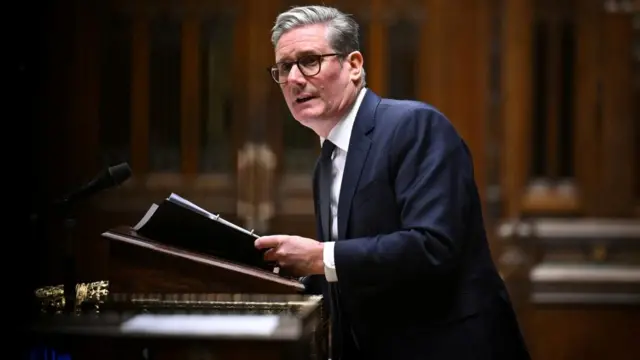 Image source, Reuters
Image source, Reuters
As we’ve reported earlier, Ukraine’s President Volodymyr Zelensky says he’s spoken with UK Prime Minister Sir Keir Starmer about Russia’s overnight attack.
We’re now hearing from Downing Street. A spokesperson says that in the call, “the leaders discussed the egregious Russian missile strike in the early hours of this morning, which had deprived more than a million people of heat, light and electricity.”
Starmer described the attack on the energy sector as “depraved”, and they also talked about “putting Ukraine in the best possible position ahead of another challenging winter of conflict”, according to the spokesperson.
“The leaders also discussed Ukraine’s long-term future, and how investment in the country’s security today would support Europe’s broader security for generations to come,” the spokesperson added.
Damage caused by US-made missiles was ‘minimal’, says Putinpublished at 14:33 Greenwich Mean Time
Sandro Vetsko
BBC Monitoring
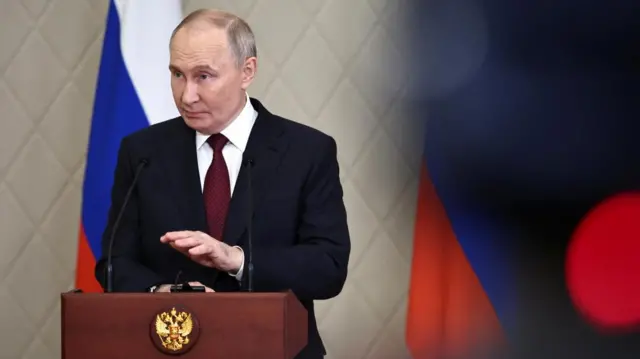 Image source, Reuters
Image source, Reuters
We’ve got more comments from Russian President Vladimir Putin.
He says the damage caused by recent Ukrainian attacks in Russia using US-made Atacms missiles was “minimal”.
Earlier, Putin said Russia had launched its assault on the Ukrainian power grid in response to those attacks with Western weapons.
“We cannot but pay attention to the fact of their use,” Putin said, in remarks at a news conference in Kazakhstan.
He said the use of Western-supplied missiles against Russia amounted to “direct involvement of Western countries” in the conflict and carried “risks”.
Ukraine ready to host second ‘peace summit’, says officialpublished at 14:17 Greenwich Mean Time
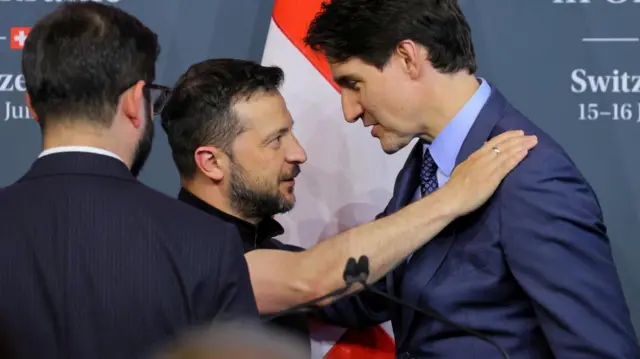 Image source, Reuters
Image source, Reuters
Ukraine’s President Volodymyr Zelensky and Canada’s Prime Minister Justin Trudeau in discussion at the peace summit in June
Ukraine is gearing up to host a second “peace summit” soon, says the Ukrainian president’s chief of staff, as reported by local media.
“Thanks to active work with our partners, a joint peace framework has already been developed, which will become the basis for the second peace summit, and Ukraine is ready to hold it in the near future,” Andriy Yermak is quoted as saying.
Ukraine’s first “peace summit” took place in Switzerland in June, where over 90 countries gathered to draft a resolution based on Ukraine’s proposed conditions to end the war.
Russia was not invited to that summit.
- Find out more about the impact of the first peace summit
What’s the latest?published at 14:00 Greenwich Mean Time
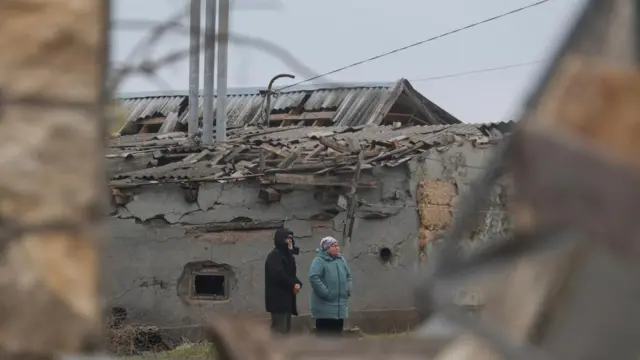 Image source, Reuters
Image source, Reuters
After Ukraine was hit by Russia’s missiles and drones overnight, we’ve heard Putin make further threats this morning. Here’s a summary of his comments and the latest developments:
- Putin has threatened to target Kyiv’s “decision-making centres” with the new ballistic missile Oreshnik
- He also said Moscow was responding to Ukraine’s use of long-range missiles, supplied by the US and the UK, inside Russia
- This claim is deliberately misleading, writes the BBC’s Sarah Rainsford, as Russia launched a previous large attack on Ukraine’s infrastructure before the Western-made longer-range missiles were used
- Putin’s comments follow Russia’s overnight drone and missile strike on Ukraine’s energy grid, leaving more than a million without power as temperatures drop
- Images show homes were badly damaged in the attack, but no fatalities have been reported so far
Baby born in hospital basement shelter during strikepublished at 13:40 Greenwich Mean Time
Vitaliy Shevchenko
BBC Monitoring’s Russia editor
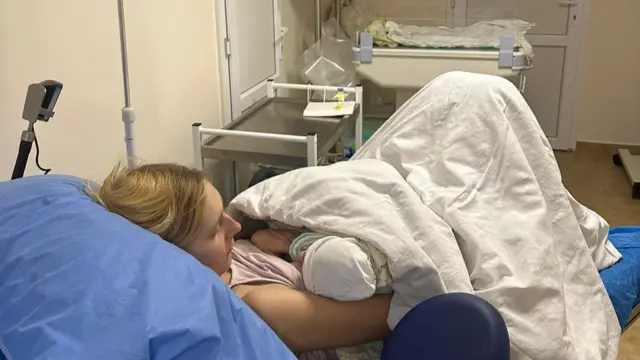 Image source, Mother Child Volyn
Image source, Mother Child Volyn
A baby girl was born in the basement shelter of the Lutsk regional maternity hospital during this morning’s Russian strike.
“The mother and child are feeling well and are now in the ward together with the others,” the regional maternity service says on social media, external.
“A fully fledged maternity room and operating theatre have been set up in the shelter. Staff are able to provide all the necessary assistance to mothers and newborns in safety during air raids,” it says.
The mother had come to Lutsk from the neighbouring Rivne region. Both regions came under Russian attack this morning and are now experiencing electricity shortages as a result.
‘Situation is under control’ – regional governorpublished at 13:25 Greenwich Mean Time
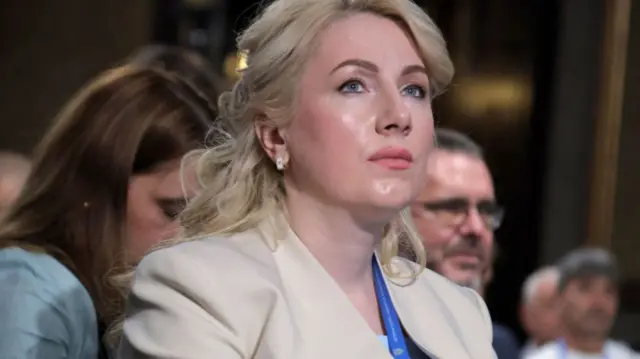 Image source, Getty Images
Image source, Getty Images
As we’ve reported, Ukraine says there are no fatalities in the latest Russian strikes.
Svitlana Onyshchuk, the governor of the Ivano-Frankivsk region in southwest Ukraine, also confirms there were no deaths in her area, although some residential buildings were damaged.
“The situation is under control,” she says in a video post on Telegram.
The governor also mentions that emergency power cuts were implemented after the attacks and that “currently, hourly power outage schedules are in effect”.
She also urges residents to remain vigilant and not ignore air alert signals.
What is Russia’s new Oreshnik missile?published at 13:11 Greenwich Mean Time
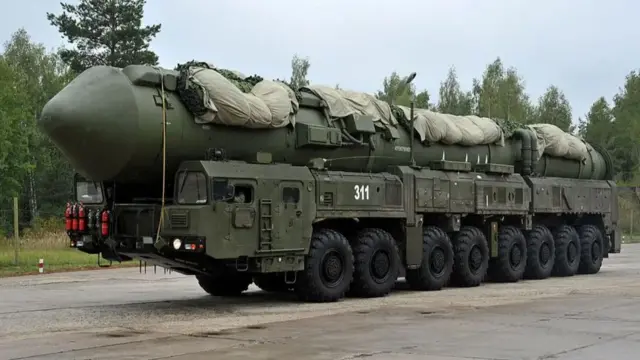 Image source, Getty Images
Image source, Getty Images
Media reports say the Oreshnik could be a scaled-down version of the Yars-M missile, which is an ICBM
President Vladimir Putin has threatened to target Kyiv’s “decision-making centres” with a new ballistic missile.
Questions have been raised about its potential impact and speed after it was used to attack the Ukrainian city of Dnipro last week.
Ukrainian military intelligence initially suggested that the missile wasa new type of intercontinental ballistic missile. Western officials have denied this, saying that such a strike would have triggered a nuclear alert in the US.
Putin described it as a “new conventional intermediate-range” missile with the codename Oreshnik, meaning hazel tree in Russian.
He said the weapon travelled at a speed of Mach 10, or 2.5-3km per second (10 times the speed of sound), claiming that “there are currently no ways of counteracting this weapon”.
If Putin’s description is correct, the missile is at the upper edge of the definition of hypersonic.
Ukraine reports 12 targets hit in Russian strikespublished at 12:57 Greenwich Mean Time
Ukraine’s air force says 12 targets were hit following Russia’s missile and drone attack overnight.
Most of the sites affected were fuel and energy facilities, according to their latest update.
They say about 90% of the cruise missiles launched by Russia were shot down, alongside three guided missiles and 35 drones, with over 60 “lost”.
The air force also says Russia’s use of “thermal and radar traps” and other technological advances makes it challenging for Ukraine to handle large-scale attacks, as it lacks sufficient Western anti-aircraft systems to safeguard its infrastructure.
They also note that the attacks occurred during “dense fog and cloud cover,” which made it more difficult for pilots and crews to respond to the strikes.
Ukraine reports no fatalities in latest Russian strikespublished at 12:41 Greenwich Mean Time
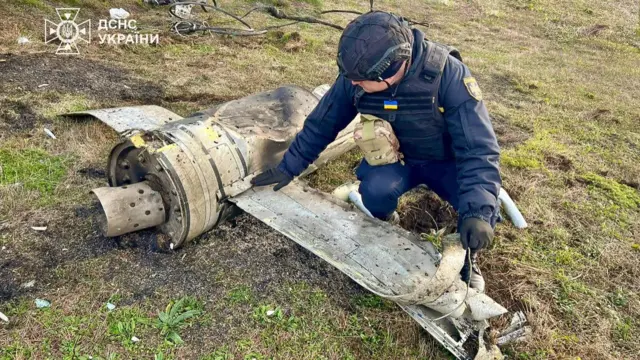 Image source, State Emergency Service of Ukraine
Image source, State Emergency Service of Ukraine
Ukraine’s state emergency services say there were no fatalities following Russia’s overnight attack, although one person was injured in the Odesa region.
More than 320 emergency workers were deployed across 14 regions, according to the service, after attacks in areas including Kyiv, Vinnytsia, Odesa, Volyn, Kharkiv, Ivano-Frankivsk, Chernivtsi, and Sumy.
“Buildings, vehicles, garages, private homes, warehouses, and a multi-storey building in Kharkiv were damaged,” they say.
These images, released by the emergency services, show the aftermath of the attacks.
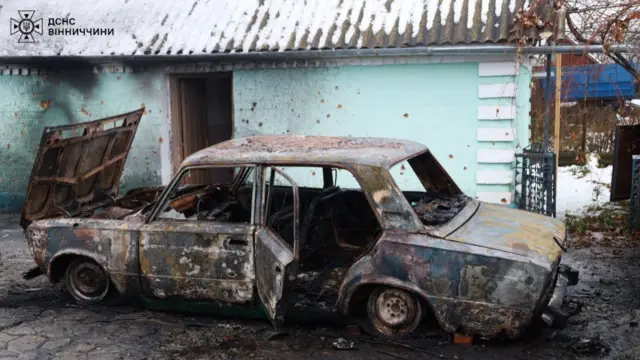 Image source, State Emergency Service of Ukraine
Image source, State Emergency Service of Ukraine
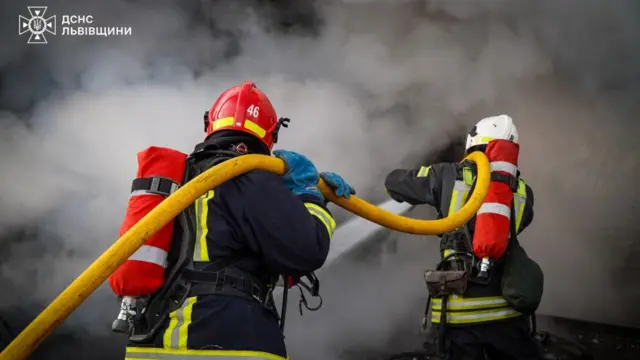 Image source, State Emergency Service of Ukraine
Image source, State Emergency Service of Ukraine
Russia carried out similar attacks before Ukraine used US and UK missilespublished at 12:25 Greenwich Mean Time
Vitaliy Shevchenko
BBC Monitoring’s Russia editor
Vladimir Putin says today’s attack came in response to Ukraine using US and UK missiles against targets in Russia.
But Russia had carried out similar – if not worse – strikes well before Kyiv was granted permission to carry out such attacks earlier in November.
For example, on 26 September Ukraine said it had been attacked with 127 missiles and 109 drones.
Earlier, on 29 December 2023, Ukraine said Russia had used 158 missiles and drones in an overnight attack.
The Kremlin appears to be really worried about Ukrainian attacks with Western missiles, and its message is that they must stop or devastation in Ukraine will continue. The truth, however, is that such devastation is nothing new to Ukraine.
Ukraine ‘begging its masters’ for military equipment, says Putinpublished at 12:14 Greenwich Mean Time
We can bring you a few more lines from Russian President Vladimir Putin’s statement earlier.
He spoke more about Russian arms capabilities, claiming that Ukrainian leaders are “begging their masters for other military equipment”.
“Let no one forget about the Kalibr systems, the Kinzhal and Tsirkon hypersonic missile systems that are in our arsenal, which have no analogues in the world in terms of their characteristics.
“Their production is also being increased, and is in full swing.”
Zelensky speaks to Starmer after latest Russian attackpublished at 11:58 Greenwich Mean Time
Ukraine’s President Volodymyr Zelensky says he’s spoken with UK Prime Minister Sir Keir Starmer about Russia’s overnight attack.
“We discussed the latest act of Russian air terror against Ukraine’s civilian infrastructure,” Zelensky says, adding that “special attention was paid to the issue of further defence co-operation”.
Zelensky expresses his gratitude for the UK’s “large-scale support, in particular for its readiness to allocate at least £3bn annually for the needs of Ukraine”.
The Ukrainian president also mentions that they agreed to “stay in close contact with European leaders” to ensure Ukraine is in a strong position “to face any developments”, including an invitation to join the military alliance, Nato.
Images show destruction following attackspublished at 11:42 Greenwich Mean Time
We’re starting to see images of the destruction after Russia’s overnight attacks in Ukraine.
Below, we can see residents in the outskirts of Odesa, in southern Ukraine, examining damage to their homes.
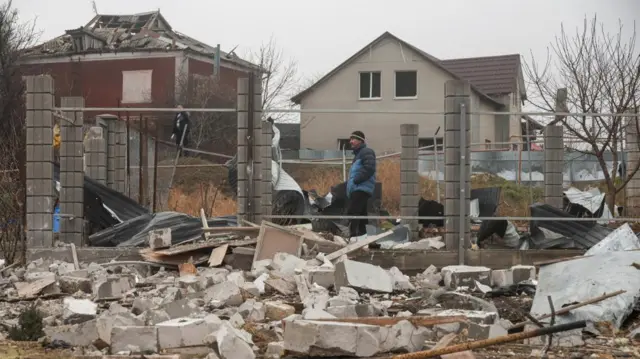 Image source, Reuters
Image source, Reuters
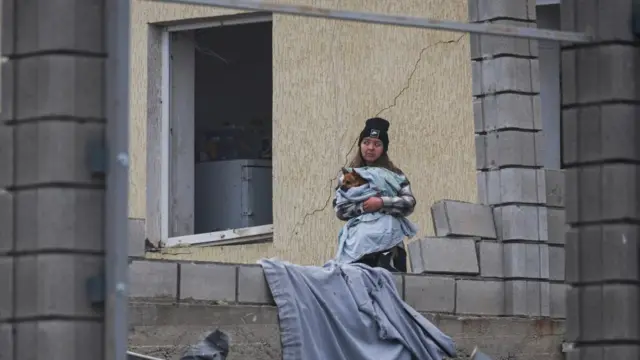 Image source, Reuters
Image source, Reuters
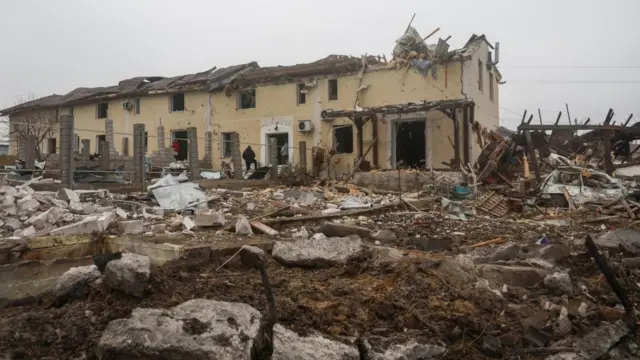 Image source, Reuters
Image source, Reuters
Russia’s attacks aim to sap strength and moralepublished at 11:30 Greenwich Mean Time
Sarah Rainsford
BBC Eastern Europe Correspondent in Warsaw
The missiles and drones are fired to knock out the power to Ukrainian homes and industry, partly to stop the production of ammunition and missiles but primarily to make life miserable for the population at large.
Ukraine has been forced to adapt to these attacks, and businesses and even many houses now have generators that kick in when the mains power is cut.
There are “invincibility points” where you can go to stay warm, get fed and charge your devices. But the point of these strikes is to sap strength and morale, and that is effective.
All the same, I think these strikes do suggest a degree of pressure on Putin himself right now: to end his full-scale invasion soon and claim some kind of win, before it becomes risky for him domestically.
So far, he’s managed to avoid any general mobilisation which would be hugely unpopular.
But tens of thousands of Russian families have lost fathers and sons and Putin has had to recruit North Korean soldiers to fill the ranks.
Putin’s forces are advancing in eastern Ukraine, but they’re still a long way off controlling all the land he long ago declared to be part of Russia.
Now he’s facing rising inflation at home, and a weakening rouble, which means those Russians who’ve managed to keep their heads down and pretend the war next door is not happening, are starting to feel its impact.
That is why Russia’s attacks on civilian infrastructure – which Kyiv denounces as terror tactics – are sure to continue – and likely escalate – as winter really begins to bite.







